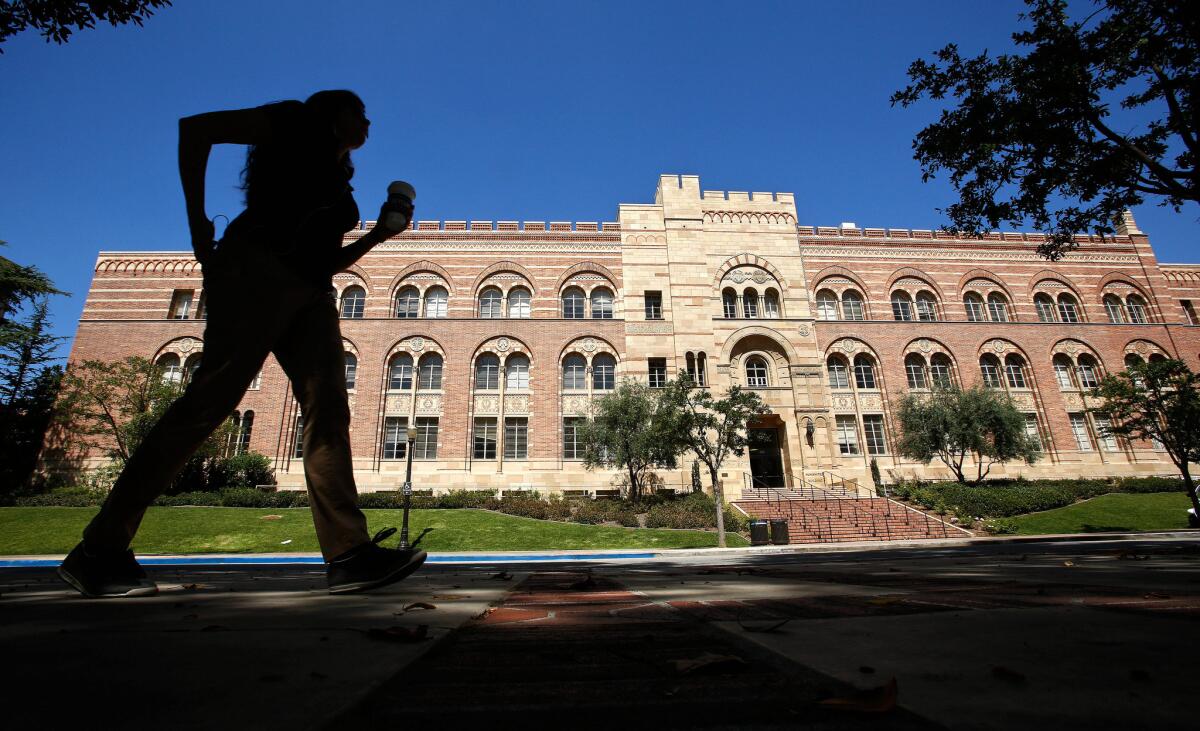Op-Ed: California universities still have barriers for students of color. Here’s how to remove them

The upheaval of 2020 has laid bare the disease of systemic racism that has long plagued our nation — and our liberal state — and we now have a unique opportunity to begin righting historic injustices. In California, one obvious place to start is education.
Neighborhood redlining, vast disparities in the quality of neighborhood schools and the monstrous, opportunity-crushing Proposition 209, passed in 1996, which ended affirmative action in the state for public employment, contracting and schooling, have all contributed to a sharp disparity in educational opportunity — and erected barriers between people of color and the great California dream.
Studies have repeatedly shown that college graduates not only earn more money than non-graduates — $1 million more over the course of a career — but are also healthier and live longer.
Last year, in the service of educational justice, the Compton Unified School District joined a lawsuit demanding that the University of California stop considering standardized test scores in admission decisions. The UC regents themselves have deemed tests like the SAT and ACT racist, both because of their content and because of the need for test preparation that can cost thousands of dollars many Black and Latino families simply don’t have.
It’s not hard to see why the tests should have no place in admissions decisions. The reason for testing is ostensibly to assess student learning. Yet even students from wealthy families engage in robust SAT test preparation, funded by well-resourced schools or parents. Don’t we have to ask whether such testing is actually just a financial enterprise posing as academic evaluation?
In recent weeks, the regents have taken some important steps. First, they suspended the testing requirement for this year because of COVID-19. They recently voted to support a state initiative to overturn Proposition 209. And, most significantly, they voted last month to eliminate the SAT and ACT requirement entirely by 2025. For the next couple of years, testing will be optional, and by 2025, the university system hopes to have its own test ready to deploy.
That’s an important and positive start, but it’s not nearly enough. We must continue to remove barriers that serve only to segregate and close doors to the very opportunities public schools were meant to promote.
Here are other steps the regents should quickly take:
Eliminate optional testing: Regents have said UC will consider SAT and ACT scores as optional in the admissions process for the next couple of years, claiming those who submit scores can only be helped by them. But if the tests are discriminatory, how can allowing some students to benefit from them make sense? UC admissions officers should not consider any standardized test scores starting today.
Stop requiring tests for scholarships: Many major scholarships continue to rely on test scores to determine eligibility. How can it be that tests so expensive to prepare for may be the very thing that determines whether an applicant gets the merit-based financial assistance needed to attend a school? Students from underrepresented communities stand the most to gain from scholarships yet are systematically discriminated against by the tests they need to qualify.
Reevaluate and properly prepare admissions staff: If we want our college campuses to better reflect the diversity in our state, we should start with their admissions staffs. An analysis by the National Assn. for College Admission Counseling found that while low-level staff in college admissions departments are fairly diverse, that changes dramatically at the upper levels. Women as well as Latino and Black people are all underrepresented in leadership positions. That matters. We need admissions officers at every level who understand the experience of Black and Latino students because they themselves are Black and Latino. Further, all admissions staff, regardless of ethnicity, should be trained in and adopt anti-implicit bias, anti-racist practices.
Emphasize overcoming hardships: One of the 14 factors the UC system considers in the admissions selection process is the life experiences and special circumstances that have affected a candidate’s academic accomplishments. These circumstances can include disabilities, low family income, the need to work while attending school, disadvantaged social or educational environments, difficult personal and family situations or circumstances, refugee or veteran status. Admissions officers can also consider whether students are the first in their families to attend college. Campuses have leeway in how much these factors are weighted, but they should have all the weight that standardized tests used to. We should be investing in young people who overcome hardships.
The regents have acknowledged problems in the UC admissions process. That’s a great first step. But their five-year timetable for fully addressing the testing issue is far too slow. We have a unique opportunity to end UC’s discriminatory admissions practices right now and put the California dream within reach of the children of color, who make up a majority of the state’s young people.
Micah Ali is president of the Compton Unified School District Board of Trustees.
More to Read
A cure for the common opinion
Get thought-provoking perspectives with our weekly newsletter.
You may occasionally receive promotional content from the Los Angeles Times.










